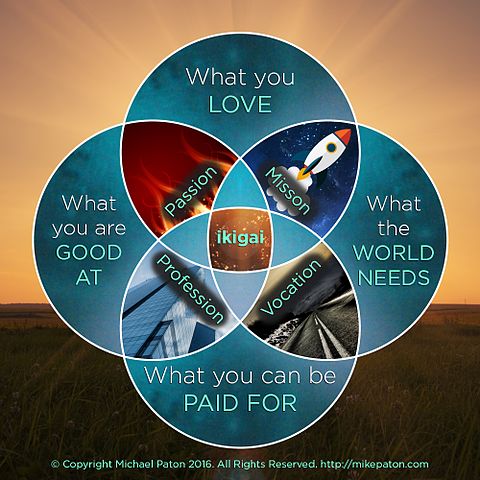The 6 Harsh Truths About Working For Passion And Finding Your Dream Job
It's going to hurt.
Every time I hear someone say “I haven’t found my passion yet,” I get worried
Actually, I thought “find your passion” advice was getting old, but Google Trends tells me it’s still very popular.
So what’s your favourite “do what you love…” passion quote? How about:
Do what you love, and…
- you’ll never have to work a day in your life
- you’ll never have a problem with Monday
- the money will follow
The above make great Instagram posts (bonus points for italics with a guy at the peak of a mountain), but how realistic are they? Should we spend our careers hunting for that elusive passion that will set our burdens free forever?
I’ve been on multiple sides of the fence on this one. I’ve been an obedient follower to whatever opportunities life threw at me. I’ve been promoted to great jobs which I didn’t feel strongly about. And I’ve also taken huge pay cuts to do work I love.
So maybe this one will help you if you’ve ever believed that finding your passion will solve all your problems.
1. You have no idea what your passion is (until you try)
Most people think passion is what they enjoy doing.
So if Harry likes karaoke, he dreams of being a full-time singer. This is oversimplifying.
Instead, I think there are three layers of understanding passion in the context of work (loosely inspired by Helen Fisher’s “Three Loves Theory” and the classic “Three Rings of Marriage” joke):
- Lust — where you occasionally dabble in things because they feel good. (e.g. the banker who paints on weekends)
- Relationship — where you seriously commit to something (e.g. the manager who quits his job for a social enterprise to work with young people)
- Suffering — where you’re so committed to your work, that you’re willing to suffer for it (e.g. the entrepreneur who continues fighting for his business — even after making losses for two years, and having to sell his home)
Most people never move past Stage 1. They just indulge in their “passion” to get those feel-good feelings every once in a while. And then daydream at work; imagining how nice it’d be to make art for a living. But they never take the next step, for reasons like “too many commitments,” and “it’s not stable.”
There’s nothing wrong with having Stage 1 interests. Not everything needs to become a serious “life vocation.” Having a normal job with time for hobbies is great too.
But if you treat it as a hobby, it’ll always be a hobby. If you really want to discover how deep is your love — you eventually have to dive in and see what happens.
2. Time changes everything
Here’s a philosophical question: do you think you have only one life purpose? A sacred mission that God Himself put you on earth to carry out. Think about that for a while…
It’s convenient to think that you have a single destiny; it’s very romantic.
So the romantic ones among us look for that one thing they were put on earth to do. I know, because I’ve spent a lot of time looking for my "life purpose" too.
But I have a different theory now: I think we have seasons in our lives. And meaning and purpose change according to seasons.
Maybe you think Elon Musk’s “purpose” is to create the supercar company Tesla and make electric cars mainstream. But he was also an early CEO of PayPal, the company that revolutionised Internet payments. And if you ask him now — he’ll likely say his mission is to get humans to Mars.
Likewise, you might be a combination of a sister, daughter, boss and employee. You’re already playing multiple roles, with different missions and different timelines. Would it be nice to f*ck everything else and focus on just one thing? Maybe, but maybe not forever.
Because you’re human, things will change. Understand that what you’re passionate about today, might be very different from what you’re passionate about in five years. Understand that the “travel the world” job you dream of today, might sound like hell when you have kids of your own. Life is a series of adjustments.
And that’s okay.
3. You will not love everything about your passion job
One of the myths about working for passion is that it’s possible to work on that one thing you love — all day, every day. “I’m a passionate foodie; I wouldn’t mind eating all day, even for free!”
Sorry to burst your bubble, glutton, but your passion job is gonna come packaged with a lot of work you don’t like. Maybe you love to write, like me. Your dream job might be writing from home every day in your pyjamas, and going to glitzy ceremonies at night to pick up your bestseller awards.
In reality, your “writing career” might consist of:
- 40% useless meetings
- 30% building proposals and chasing clients for payment
- 20% drama with bitchy colleagues
- 10% writing mindless advertisements for clients with zero sense of style.
Oh, for low pay too!
Yeah, you still get to write for a living. But that won’t be your only job. You also have to deal with all the shit that comes with it.
I feel strongly about this one, because by a lot of people’s standards (including my own) — I currently have the job of my dreams. But even then, it’s difficult, uncomfortable and scary.
And if I’m being very honest — there’s a lot about it that I hate too.
4. Committing to your passion changes your relationship with it
When I started working for passion, I discovered something very uncomfortable: things change when you get serious. Things gets complicated. Kinda like when you meet someone you like…
Spending a couple of hours with someone new, beautiful and interesting is very different from getting into a relationship with them.
One’s a fling; one’s a partner. One is based on excitement and pleasure. One is based on sacrifice, commitment and compromise.
One is holding Amy close to your chest and stroking her gorgeous brown hair gently for 15 minutes. One is dealing with crazy mood swings, even crazier family members, and her gorgeous brown hair messing up your bathroom drain every day.
Likewise, it’s easy to love something when it’s a hobby. It’s your release. But everything changes when you depend on it for a living. Everything changes when there’s money involved.
Will you still be so passionate about doing charity, when you struggle to pay your own bills? Will your passion die, if you have to follow your stupid clients’ orders — instead of doing it the way you believe in?
Will you still love her after you’ve gone through hell together?
5. You might suck at your passion
This might the biggest misconception of all: If you love something, you magically become good at it. Bullshit.
Just because you like something (or someone) doesn’t mean it will like you back. Even if it does like you back, that doesn’t mean it’ll give you money. Even if it gives you money — that money might not be enough to feed you.
When it comes to pure passion, I actually love sports more than anything else. Way more than what I’m commonly known for: writing about money. But you don’t read about me in the newspaper sports section, because I’m not 1% of Cristiano Ronaldo, and never will be.
It’s not that passion is useless. The great thing about passion is it makes you persevere at things. So even if you get kicked out of Asia’s Got Talent two years in a row, your passion for singing might keep you going — keep you believing, practicing and improving. Love helps with resilience.
But that doesn’t mean you’ll ever become good enough to be a paid singer.
The diagram below talks about “Ikigai,” an ancient Japanese concept associated with “happiness in living.” I’m a firm believer that each one of us needs to search for our own Ikigai — that magical intersection between:
- What you love
- What you’re good at
- What the world needs
- What you can be paid for
But don’t expect to get paid big bucks doing something you love today. Maybe you’ll need another ten years of practice, or maybe you’ll need to try another ten different things.
6. Your passion will hurt you
Of all the harsh truths about working for passion, this one hurts the most.
Remember how I said committing to a passion project changes your relationship with it? Well, it eventually leads to suffering.
I once had a job which sounds like a travel junkie’s wet dream. Good people around me, good money, and lots of travel around the world. I wasn’t bad at it either. If you look at the Ikigai diagram, it’d be somewhere in between Profession and Vocation. But like any ungrateful millennial, I wanted to try something else. Because the job didn’t set my heart on fire.
I’d like to think I was always professional (though I did fall asleep in meetings a couple of times). But not having a “passion job” had an underrated benefit: I could separate myself better from stress.
No matter how shitty my work days were, I could shrug my shoulders at the end of the day and say, “It’s just a job. I did my best.”
But things change when you do work you care deeply about. Things become personal. For the past two years, I’ve been working at a social enterpise which is aligned with my core principles. I absolutely believe in the work we do to transform the nation. Even with a lot less pay, on good and average days — it feels like a dream life.
But this comes with a price. On bad days, I sometimes feel like shutting myself away from everyone, crumpling into a ball, and crying my heart out.
The more you care, the more it will hurt.
So, is working for passion as “bad” as I portray it to be here? No, that’s not what I’m getting at.
I just don’t want people to jump into passion projects without realising blind spots. Without realising that if they have unrealistic expectations — they might end up killing their passion.
I want people to know it’s not easy, and it’s not predictable.
But do I regret living a life where I went after my passion? No. And I think if you ask 100 people who’ve gone down this path — most of them don’t either.
It’s both a blessing and curse to work for passion. And while the blessings have obviously been oversold, let’s not forget that meaningful things almost always come with sacrifice.
I guess the question then isn’t the overused “Does this make me happy?,” but rather:
“Is this worth suffering for?”
The full article originally appeared on mr-stingy.com.
This story is the personal opinion of the writer. You too can submit a story as a SAYS reader by emailing us at [email protected].





